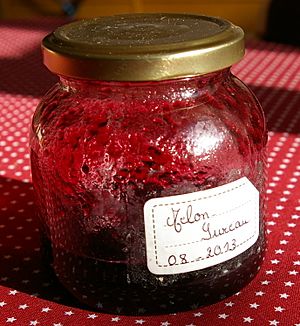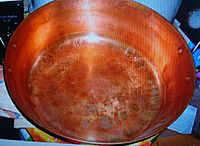Confiture facts for kids

Elderberry confiture (jam)
|
|
| Type | Jam, marmalade, paste, sweetmeat, or fruit stewed in thick syrup |
|---|---|
| Main ingredients | Fruit |
A confiture is a sweet spread made from fruit. It can be like a jam, marmalade, or a thick fruit paste. The word "confiture" comes from the French word confire, which means "to preserve". This tells us that confitures are a way to keep fruit fresh for a long time.
Confitures are made by cooking fruit with sugar until it becomes thick. This method of cooking and preserving food has been used for hundreds of years. Before refrigerators, preserving food was very important.
Contents
What is Confiture?
Confiture is a general term for many kinds of fruit preserves. It includes popular items like jam and marmalade. The main idea is to cook fruit with sugar. This process helps to keep the fruit from spoiling. It also makes a delicious, sweet spread.
Jam vs. Jelly vs. Marmalade
There are a few different types of fruit preserves. They are all related to confiture.
Jam
Jam is made from crushed or chopped fruit. It includes parts of the fruit pulp. This gives jam a thicker texture. It often has small pieces of fruit in it. Strawberry jam and raspberry jam are common examples.
Jelly
Jelly is different because it uses only the fruit juice. The fruit pulp is strained out. This makes jelly clear and smooth. It has a jiggly texture. Grape jelly is a very popular type of jelly.
Marmalade
Marmalade is usually made from citrus fruits. These include oranges, lemons, or grapefruit. It contains small pieces of the fruit peel. This gives marmalade a slightly bitter taste. It is often eaten for breakfast.
How Confiture is Made
Making confiture is a simple process. It involves a few key steps.
Choosing the Right Fruit
The best confitures start with fresh, ripe fruit. The fruit should be in season for the best flavor. Different fruits give different tastes and textures. Berries, stone fruits, and citrus fruits are all popular choices.
Cooking with Sugar
The fruit is cooked slowly with sugar. The sugar does two important things. First, it adds sweetness. Second, it acts as a natural preservative. The heat from cooking also helps to kill bacteria. This prevents the fruit from going bad.
The Thickening Process
As the fruit and sugar cook, water evaporates. This makes the mixture thicker. Some fruits naturally contain pectin. Pectin is a substance that helps the confiture set. If a fruit is low in pectin, extra pectin might be added. This ensures the confiture gets the right consistency.
History of Fruit Preserves
People have been preserving fruit for a very long time. This practice dates back centuries.
Early Preservation Methods
Before modern refrigeration, people needed ways to store food. Drying and salting were common. Cooking fruit with honey or sugar was another early method. This allowed people to enjoy fruit even when it was not in season.
The Rise of Sugar
Sugar became more available in Europe during the Middle Ages. This led to more widespread use of fruit preserves. By the 17th and 18th centuries, making jams and jellies was common. They were enjoyed by many families.
Modern Confitures
Today, confitures are still popular. They are enjoyed around the world. They are often eaten on toast, bread, or pastries. They can also be used in baking or as a topping for desserts. While we have refrigerators now, the tradition of making confiture continues. It is a delicious way to enjoy the taste of fruit all year long.
See also
 In Spanish: Confitura para niños
In Spanish: Confitura para niños
 | Sharif Bey |
 | Hale Woodruff |
 | Richmond Barthé |
 | Purvis Young |


